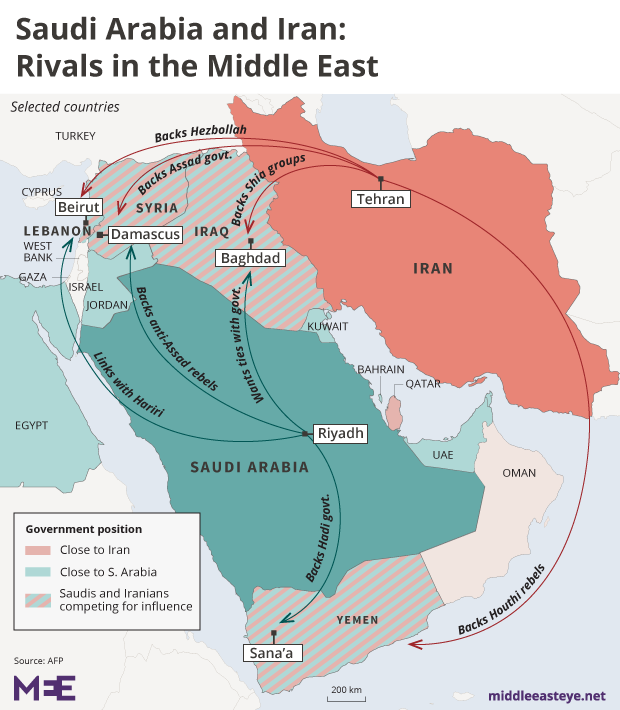Friedman argues that�the Iran nuclear deal�was a bet worth making, but like many critics of the deal, he claims that it enabled Iran�s overreach in four Arab capitals: Baghdad, Damascus, Sanaa and Beirut. I believe he is wrong.
In the Iran-US wrangling over the past three decades, Tehran has repeatedly delivered on its promises, while the US has fallen short. In the late 1980s, President George HW Bush�askedIran to help with the release of Western hostages in Lebanon, vowing �goodwill for goodwill�. Iran facilitated the release; in return, the US increased pressure on Iran.
The 'axis of evil'
In 2001, when the US�asked�for Iran�s support in its "war on terror" in Afghanistan, Iran�s Revolutionary Guard Corps gave crucial�intelligence�to the US military. Tehran also played a constructive role in�Afghanistan�by throwing its full support behind the US-backed president, Hamid Karzai - but President George W Bush responded by putting it on the "axis of evil".
According to�Ryan Crocker, the former US ambassador to Afghanistan and Iraq, Iranian diplomats were "pragmatic and focused" when it came to assisting in Afghanistan, at one point even producing �an extremely valuable map showing the Taliban�s order of battle just before American military action began�.
That all ended after the infamous "axis of evil" speech, as the Iranian leadership �concluded that in spite of their cooperation with the American war effort, the United States remained implacably hostile to the Islamic Republic�.
Iran also delivered on its promises in the 2015 nuclear deal. The International Atomic Energy agency�repeatedly confirmed�that Iran was upholding its end of the bargain - but not only did the US�withdraw from the deal, it has also since engaged in a maximum pressure policy, aiming to force Iran to capitulate to its demands.
In his recent�statement, Trump launched straight into an attack on Iran as the root of all evil, rather than immediately addressing what was meant to be the subject at hand, namely Saudi Arabia and the killing of journalist Jamal Khashoggi. Trump should also know that 15 of the 19 hijackers who perpetrated the 9/11 attacks on the United States�were�Saudis. There was not even one Iranian among them.

Carl Bildt
?@carlbildt
Summary of Trump statement today: If you buy US weapons and if you are against Iran - then you can kill and repress as much as you want. https://www.washingtonpost.com/politics/2018/11/20/trumps-full-statement-giving-saudi-royal-family-pass-jamal-khashoggi-annotated/��

Analysis | Trump�s statement smearing Jamal Khashoggi and giving Saudi Arabia a pass, annotated
In the exclamation-point-laden statement released before the CIA report is due, Trump makes clear that he's not going to punish Saudi royalty for Khashoggi's killing.
washingtonpost.com
In each of the important episodes outlined above, Iran respected the rules of the game, while the US reneged on its promises. It is also important to recall that Iran's engagements throughout the region predated the nuclear deal. After the 2003 US invasion of Iraq, Iran�intervened�in Iraq only after a number of US officials openly�called�for an American invasion of Iran to follow that of Iraq.
In Syria, Iran's involvement has not happened in a vacuum, either.
Projecting Saudi power
On Saudi Arabia, Friedman argues that Trump vowed to advance US interests in the region by selling $110bn in arms to Saudi Arabia and betting on Crown Prince Mohammed bin Salman - but bin Salman "used his carte blanche" to�project�power and stretch far beyond his capabilities by intervening in Yemen, blockading Qatar, abducting the prime minister of Lebanon,�cracking down�on female activists and "permitting, if not�ordering, his team to murder moderate Saudi democracy advocate Jamal Khashoggi".

Friedman is wrong about Saudi Arabia too. The wars in Yemen, Syria and Libya have all been joint Saudi-US campaigns. Moreover, Washington and Riyadh jointly supported Saddam�s invasion of Iran and the use of�chemical weapons�against Iranians. The US turned a blind eye to Saudi Arabia, even though it was well aware of the latter�s�support�for extremist groups.
In the 1990s, the Saudis heavily funded madrassas that taught a fundamentalist version of Islam, Obama acknowledged, according to a 2016�Atlantic article. The US-backed�Saudi campaign in Yemen has led to the world�s worst humanitarian�disaster, and has bolstered extremist groups in the region and beyond. Even after the gruesome murder of�Khashoggi, the US�imposed�severe sanctions on Iran, but did nothing to punish Saudi Arabia.
US domination
There is no doubt that Obama�s strategy was different from Trump�s. �The competition between the Saudis and the Iranians - which has fuelled proxy wars and chaos in Syria and Iraq and Yemen - requires us to say to our friends as well as to the Iranians that they need to find an effective way to share the neighbourhood and institute some sort of cold peace,� Obama�told�the Atlantic. Yet, despite the Khashoggi affair, Saudi Arabia today lies at the centre of Washington�s strategic and political policy in the region.
The Middle East has been dominated by the US for decades. Multiple wars in the region - from Afghanistan, to Iraq, to Libya, to Yemen - are the real source of instability, sectarian conflict and the rise of terrorist groups such as the Islamic State (IS) and al-Qaeda. �Iran has not launched an aggressive war in modern history (unlike the US or Israel), and its leaders have a doctrine of �no first strike�,"�notes�University of Michigan history professor Juan Cole.
While the West and some regional actors are concerned about Iran�s regional influence, Tehran also has serious and legitimate concerns. As a confidence-building measure, all parties to the nuclear deal - including the US - should respect their obligations to foster peace and stability in the Middle East.
-�Seyed Hossein Mousavian�is Middle East Security and Nuclear Policy Specialist at Princeton University and a former spokesman for Iran�s nuclear negotiators.�His book,�The Iranian Nuclear Crisis:�A Memoir,�was published in 2012 by the Carnegie Endowment for International Peace.�His latest book,��Iran and the United States: An Insider�s view on the Failed Past and the Road to Peace��was released in May 2014.










